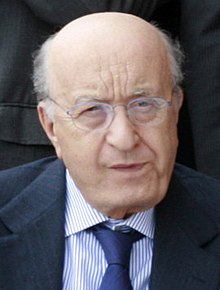Ciriaco De Mita
|
The Honourable Ciriaco De Mita |
|
|---|---|
 |
|
| 47th Prime Minister of Italy | |
|
In office 13 April 1988 – 22 July 1989 |
|
| President | Francesco Cossiga |
| Preceded by | Giovanni Goria |
| Succeeded by | Giulio Andreotti |
| Mayor of Nusco | |
|
Assumed office 26 May 2014 |
|
| Preceded by | Giuseppe De Mita |
| Minister responsible for extraordinary interventions in Southern Italy | |
|
In office 29 July 1976 – 20 March 1979 |
|
| Prime Minister | Giulio Andreotti |
| Preceded by |
Giulio Andreotti (by delegation of functions) |
| Succeeded by | Michele Di Giesi |
| Minister of Foreign Trade | |
|
In office 23 November 1974 – 29 July 1976 |
|
| Prime Minister | Aldo Moro |
| Preceded by | Gianmatteo Matteotti |
| Succeeded by | Rinaldo Ossola |
| Minister of Industry, Trade and Manufacturing |
|
|
In office 7 July 1973 – 23 November 1974 |
|
| Prime Minister | Mariano Rumor |
| Preceded by | Mauro Ferri |
| Succeeded by | Carlo Donat-Cattin |
| Undersecretary of the Interior Ministry | |
|
In office 14 December 1968 – 5 August 1969 |
|
| Prime Minister | Mariano Rumor |
| Preceded by | Angelo Salizzoni |
| Succeeded by | Ernesto Pucci |
| Personal details | |
| Born |
2 February 1928 Nusco, Campania, Italy |
| Nationality | Italian |
| Political party |
Christian Democracy (1963–1994) Italian People's Party (1994–2002) The Daisy (2002–2007) Democratic Party (2007–2008) Union of Centre (2008–present) |
| Spouse(s) | Anna Maria Scarinzi |
| Children | 4 |
| Residence | Avellino, Campania |
| Alma mater | Catholic University of Milan |
| Religion | Roman Catholicism |
Ciriaco Luigi De Mita (Italian pronunciation: [tʃiˈriːako luˈiːʤi de ˈmiːta]; born 2 February 1928) is an Italian politician. He served as the 47th Prime Minister of Italy from 1988 to 1989 and as Member of the European Parliament from 2009 to 2013.
De Mita was born in Nusco in the Avellinese hinterland.
As a young man De Mita joined Christian Democracy and entered politics. He rose through the ranks of the party, becoming a member of its council in 1956, a member of Parliament in 1963 and a member of the Italian cabinet in 1973. During the next decade he served as Minister of Industry and then as Minister of Foreign Trade.
De Mita became chairman of the party in 1982 at a time when its power was declining. He was re-elected in 1986 with 60% support from the party.
The Christian Democrats did well in the elections of 1987. De Mita waited a year to become Prime Minister, and then served as Prime Minister for a year, maintaining the party chairmanship. At the beginning of that service, on 16 April 1988, in Forlì, Red Brigades killed Senator Roberto Ruffilli, an advisor of De Mita.
In social policy, De Mita's time in office witnessed the passage of a law in May 1988 that introduced a new benefit for salaried workers called “benefit for the family nucleus” (assegno per il nucleo familiare”), with the amount varying depending on the number of family members and the family income of the previous year.
De Mita returned in Parliament, after a lag of two years, in 1996 (and then re-elected in 2001 and 2006). He then joined the Italian People's Party and later Democracy is Freedom - The Daisy, party of which he is regional coordinator for Campania. He headed the Olive Tree's list in his region in 2006, and he participated in the transformation that coalition into a single party (the Democratic Party). Following an attempt by the chairmanship (presided by Walter Veltroni) at rejuvenating the ranks of the Democratic Party, De Mita was refused a place on the ballot for the 2008 general election, on the grounds that a total of 44 years and 9 months of active presence in the Italian Parliament was long enough and that more space was needed to be given to younger candidates. Offended by the decision, he left the party in retaliation, and joined the Union of the Centre. After the 2008 elections, De Mita was not elected at the Italian Senate, but he was nominated as the Campania coordinator of the party.
...
Wikipedia
